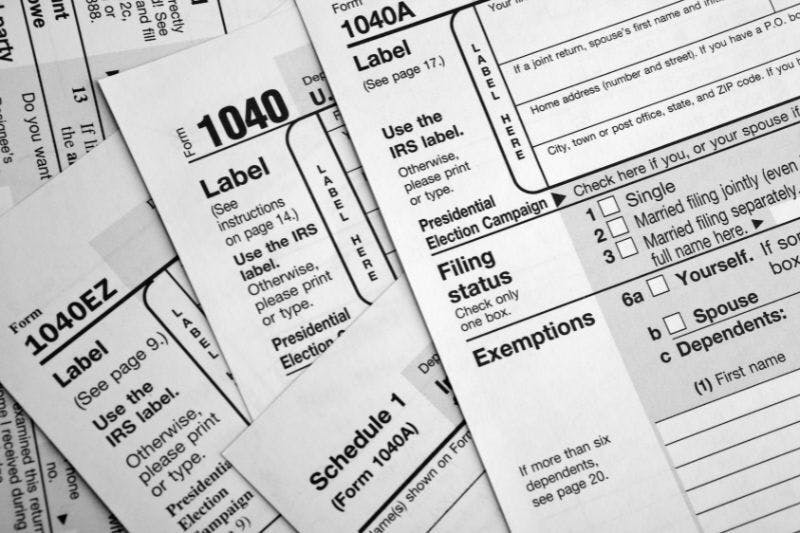
Dealing with a loved one’s death is hard and often mentally taxing. Unfortunately, this grieving process can get even more difficult in some situations. One such difficulty arises when a person leaves the world with unpaid taxes.
Dealing with a loved one's tax filing won’t be the first thing on your mind right after a death. However, sooner or later, it’ll be your responsibility as their heir to arrange for their federal taxes or any other outstanding tax liabilities.
We understand that not everyone knows a professional accountant who can help them manage money-related matters. Also, even those great at accounting can fail in handling tax debts when a loved one passes. That’s why we’re breaking down all that you should know about filing taxes on behalf of a deceased person.
Before you move ahead, we'd like you to understand that dealing with tax debt, tax liabilities and bookkeeping aren't easy. Hence, whatever we explain below can overwhelm you at first. But, we suggest you don't worry about this too much. Take your time reading things slowly, and you’ll surely get there.
Who Pays A Deceased Person's Taxes?
In almost all cases, the estate executor of the deceased manages and pays-off their debts and taxes owed. Executors are professionals who administer the estate of a deceased person. Usually, people instruct their executors about their estate’s assets and what their estate's distribution should be after their death.
The deceased person’s executor also notes down other estate and property-related wishes of a person and follows through with them after a person dies. Usually, an executor is the only one to know all about a deceased person's accounts. Hence, they are often great at managing such a person’s estate income taxes and other outstanding taxes [Nb keywords]
If you're an heir or beneficiary to the deceased, an estate executor will contact you soon after your relative's death. However, some people don't appoint an executor during their lifetime. In such cases, the family of the deceased should contact the court to appoint an executor. In some other instances, people name their children or surviving spouse as their estate executors or personal representative.
Regardless of whoever the executor is, the closest relatives of the deceased must take up the responsibility of filing taxes in their absence. The information in the following section of this article can help you file taxes accurately [nb keyword].

Source: Canva/GettyImages
Step-By-Step Method of Filing A Deceased Person's Taxes
Follow the steps given below to file a deceased person’s taxes without any complication.
STEP 1: CONTACT IRS AND GATHER THE NEEDED INFORMATION
When a person dies, their will isn't acted out automatically. Rather, the beneficiaries get their share after going through a proper process. Paying the debts and taxes owed by the deceased is the first step of this process. This step, however, requires you to have all the account-related information of the deceased.
If you don't have access to the deceased person's records, you need to request it from IRS. The IRS requires that anyone who demands access to such information must be a close relative of the deceased. You'll need a few documents to prove your relationship for access to the deceased's financial record.
In most cases, the IRS requires you to submit the following:
The name, SSN, and full address of the deceased
A copy of the deceased individual's death certification
A copy of the letter of testamentary issued to you by the court
A copy of IRS form 56, proving your relationship with the deceased
The report of the deceased’s tax returns
STEP 2: CHOOSE AN ESTATE ADMINISTRATOR FOR THE DECEASED
As already stated, the estate executor is often already nominated by the deceased during their lifetime. But you also have to choose an estate administrator who represents all the assets of the deceased. You’ll only be able to deal with the tax obligations after picking an estate administrator.
Some common examples of estate administrators include the deceased person’s close relatives, such as:
Surviving Spouse
Children
Siblings
Close family members
Executors (if mentioned in the decedent’s will)
Once selected, an estate administrator has the following responsibilities:
Gathering all the decedent’s assets, including the decedent’s estate and savings at one place
Paying all the debts that the deceased owed
Demanding the money that the deceased might have lent to someone during their life
Distributing the remaining estate to the beneficiaries as per law or the deceased’s will
Filing taxes and the tax returns for the deceased on IRS form 1040 and 1041, respectively

Source: Pexels
STEP 3: RETURNING THE CREDITOR’S MONEY
Once someone is finalized as an estate administrator, they need to begin by contacting all the people to whom the deceased owed money. You need to send all the creditors a notice informing them of your loved one’s death.
These creditors should then respond to the petition with proof of claim within 3 months. This proof of claim will mention the exact amount that the deceased owed them. This proof of claim also comes with the documents proving that the sender lent money to the deceased.
STEP 4: FILING THE DECEASED’S INCOME TAX RETURN
After you've paid back all the money owed by the deceased, you need to file their final income tax return. The tax return process for a deceased person is no different than that for a living one. Hence, you should report all that they had earned up till their death on their tax return file.
In this step, you have to proceed very carefully as an estate administrator. Make sure that the deceased paid their taxes for the previous years. If they haven’t, then you have to do that for them too. It's best to consult a tax preparation service at this stage to deal with all tax-related matters.
The taxation professionals will often do all that you need to do at this point. This can free you of the stress that comes with IRS debt and ill-managed taxes of the deceased.
STEP 5: FILING THE DECEASED’S ESTATE INCOME TAX RETURN
Other than the income taxes, an estate administrator must also file an estate tax return for the estate transfer from the deceased to their heirs. Additionally, there's also a tax for income that the deceased’s assets generated. These assets include:
Land owned by the deceased
Mutual funds
Stocks
Bonds
Investments
Marketable Security
You have to file returns for both these taxes before moving ahead.
STEP 6: DISCHARGE THE FEDERAL ESTATE TAX LIEN
In many cases, the heirs may want to sell some of their inherited property. However, no one can sell anything that the deceased person owned without the permission of the state. The IRS often places a lien estate tax on the deceased's assets right from the day they die.
This lien tax prohibits the heirs of the deceased from selling any of the deceased's property before paying all the inheritance taxes and debts owed. In case you want to sell the property of the deceased after filing all the taxes, you have to first discharge the lien.
The process of discharging is simple. You just have to apply for a discharge lien certification from IRS form 4422. Other than this form, you've to submit a copy of the deceased's will and other documents related to the sale of the decedent's estate.
Once the lien taxes are discharged, you can easily sell the deceased’s property without IRS demanding anything from you.
Final Words
Once you complete all these steps, the decedent’s tax liabilities have been taken care of. Though this process is not an easy one, following the steps above will hopefully ease the burden of an already difficult situation.